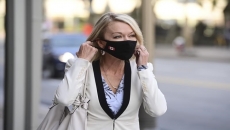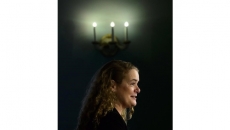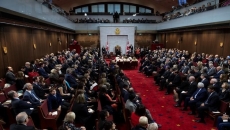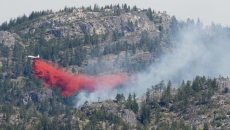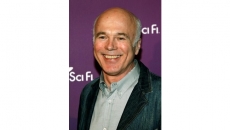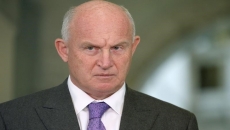Planning for a state funeral for former prime minister John Turner is proceeding in the shadow of the COVID-19 pandemic, as his family and the government determine how to honour his public life while public events are restricted.
Turner died last Friday at 91. Typically, a former prime minister would be honoured with a public observance of the highest dignity and pomp. But the prospect of spreading COVID-19 will curtail the possibilities for Turner, as it has for many others who have died during the pandemic.
The Turner family's spokesman Marc Kealey said Tuesday the family is still discussing with government officials the date of the funeral and how many people will attend in person.
Canadian Heritage spokeswoman Amelie Desmarais said all decisions regarding funeral arrangements will be made in accordance with the family’s wishes and following advice from public health authorities.
She said Canadians can send their condolences to the family by signing an online book of condolences or by sending their thoughts privately.
"That’s just a fact of life,” said Donald Wright, an expert in Canadian political history at the University of New Brunswick. "Whatever rules are put in place by public heath (officials) will have to be followed by the organizers of Mr. Turner's funeral."
He said state funerals are important because they allow people to mark someone’s remarkable life, celebrate their accomplishments and publicly grieve as Canadians.
"Maybe there'll a virtual (event) where Canadians can watch it either online, or maybe it will be televised — they can watch it on television," Wright said.
State funerals have often included public processions in the streets of Ottawa and periods of lying in state, usually in Parliament, to give an opportunity for Canadians to pay final respects.
Organizers also usually offer public books in locations across the country so people can sign and offer comments, and those books are often deposited with Library and Archives Canada, Wright said.
The last state funeral for a Canadian prime minister was for Pierre Trudeau in 2000.
Wright said that the surprising thing about Pierre Elliott Trudeau’s state funeral is that was a spontaneous moment of national grief.
"The countless Canadians going to Ottawa. The train that carried his body from Ottawa to Montreal for the funeral and people lining up along the railway, that was spontaneous — that wasn't organized by the state," said Wright.
People lined up for hours outside Parliament's Centre Block for a moment with Trudeau's casket and buried the Centennial Flame in flowers.
"It really was a response to this need to grieve together."
Justin Trudeau's televised eulogy for his father at Montreal's Notre-Dame Basilica was a signal moment in the current prime minister's emergence as a national figure.
State funerals are rare. According to the federal government, only 31 state funerals have been held in Canada since Confederation in 1867, including 12 for prime ministers, seven for governors general and eight for cabinet ministers.
Three other members of Parliament have also been given state funerals: the assassinated Thomas D'Arcy McGee in 1868 and, more recently, NDP leader Jack Layton and former finance minister Jim Flaherty.
The government announced a half-masting of the national flags on the Peace Tower and all federal buildings and establishments in Canada to honour Turner's memory. Flags will be at half-mast until the sunset on the day of his funeral.

